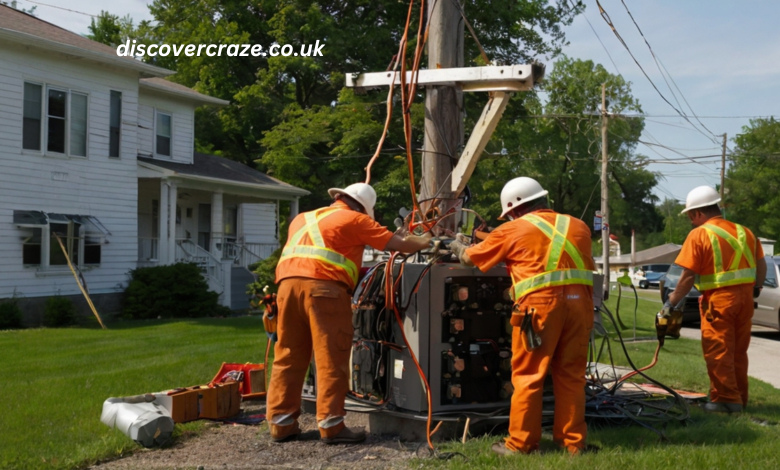Introduction: Understanding the Muscatine Power and Water Transformer Outage
The Muscatine Power and Water Transformer Outage stands as one of the most significant incidents to affect the Muscatine community in recent history. Power outages are never convenient, but when a major transformer fails, it affects not only the flow of electricity but also essential services such as water supply. The recent outage had a wide-reaching impact on the daily lives of residents and businesses, and the restoration of services, though quick, raised important questions regarding the resilience of the power infrastructure. In this article, we will analyze every aspect of the Muscatine Power and Water Transformer Outage, from the causes and immediate consequences to the recovery efforts and long-term implications for the utility’s operations.
This outage occurred on [specific date], and it served as a stark reminder of the vulnerability that communities face when dealing with aging infrastructure and unforeseen technical failures. In the following sections, we will break down the incident in chronological order, providing a detailed understanding of what transpired, how the community responded, and what steps Muscatine Power and Water (MPW) has taken to prevent future outages.
What is a Transformer and How Does It Impact Power Distribution?
To understand the significance of the Muscatine Power and Water Transformer Outage, it’s essential first to understand what a transformer is and its role in the electrical grid. A transformer is a critical piece of infrastructure that adjusts the voltage of electricity to make it suitable for distribution to homes, businesses, and industries. In essence, transformers help manage the flow of electrical power by stepping down high voltage electricity to levels that can be used by everyday consumers.
In Muscatine, the power grid is interconnected with a series of transformers that ensure the reliable distribution of power. When one of these transformers fails, it can disrupt the entire distribution system, causing outages that affect vast swaths of the community. The failure of the transformer in this instance meant that not only were homes and businesses left without electricity, but it also created ripple effects throughout the local water supply system. The outage highlighted the dependence that modern communities have on electricity and the far-reaching effects when such a critical component fails.
The Muscatine Power and Water Transformer Outage forced many residents to confront the vulnerabilities in their daily life, as power and water services were temporarily unavailable. The outage underscored the importance of maintaining a robust and well-maintained power distribution infrastructure in order to minimize disruption during unforeseen events.
The Causes Behind the Muscatine Power and Water Transformer Outage

Investigating the causes of the Muscatine Power and Water Transformer Outage is essential for understanding why the incident occurred. While each transformer failure is unique, there are a few common reasons why such events take place. In this case, the failure was attributed to an internal malfunction within the transformer. However, it’s important to delve deeper into the potential causes to identify broader issues in infrastructure management.
One key factor is the age of the transformer. Many transformers, especially in smaller towns and municipalities like Muscatine, are older and have been in service for several decades. Over time, the wear and tear on such equipment can make it more susceptible to failures, particularly if regular maintenance is not conducted. Although Muscatine Power and Water does perform routine inspections, unexpected failures can still occur.
Another possible factor is environmental conditions. Transformers can be affected by extreme weather events, such as thunderstorms, lightning strikes, and high winds, which can cause damage to equipment and disrupt power transmission. While there was no immediate indication that weather was a contributing factor in this case, such environmental impacts are often involved in power-related failures.
Additionally, the sheer demand on the system at certain times of the year—especially during heatwaves or cold fronts—can place significant strain on transformers, potentially leading to failures when systems are overloaded.
The Immediate Impact of the Muscatine Power and Water Transformer Outage
The Muscatine Power and Water Transformer Outage had immediate and widespread effects on the city of Muscatine. The outage led to power losses in many neighborhoods, leaving thousands of residents without electricity for several hours. For many, this meant the loss of basic amenities such as lights, heating, and cooling systems. For businesses, the disruption was even more significant, as many establishments were forced to close their doors during the outage.
In addition to the power failure, the water supply was also affected. Since Muscatine Power and Water operates both the electrical and water distribution systems, the transformer failure caused issues with water pressure and supply. This created a cascading effect, as residents found themselves without water or with significantly reduced water pressure for an extended period.
Local hospitals, schools, and emergency services also felt the effects of the outage. Medical facilities rely heavily on uninterrupted power to run life-saving equipment and provide care to patients. In some cases, backup generators were required to maintain operations, but these systems often have limited capacities, leading to difficult decisions about which equipment and services could continue running.
How Muscatine Power and Water Responded to the Outage
Once the Muscatine Power and Water Transformer Outage occurred, MPW’s priority was to restore services as quickly as possible. The utility activated its emergency response protocols, which included dispatching repair teams to assess the damage and begin working on restoring the transformer to normal operation. The team quickly identified that the failure was internal, and extensive repairs would be necessary.
Throughout the outage, MPW provided regular updates to residents via social media, local news outlets, and direct notifications. The transparent communication helped keep the community informed about the progress of repairs and when they could expect services to be restored. It was evident that MPW took the outage seriously and was committed to minimizing downtime.
Within hours of the failure, crews were on the ground working to isolate the issue, repair the damaged transformer, and restore power. Given the technical complexity of the situation, MPW had to rely on specialized equipment and expert technicians to expedite the repairs. The goal was not only to restore power but to ensure that such a failure would not happen again in the future.
Challenges Faced During the Restoration Process
Restoring services during the Muscatine Power and Water Transformer Outage was not without its challenges. The primary difficulty was the time-consuming nature of transformer repairs. Unlike smaller electrical components, transformers are large, intricate machines that require a thorough inspection before they can be fixed. In this case, the repair process was complex, requiring MPW technicians to work methodically to avoid further damage to the system.
Another challenge involved the coordination between MPW’s electrical and water departments. While the primary focus was on restoring electricity, the failure of the transformer also created water supply problems. As repairs to the transformer progressed, MPW’s water teams had to simultaneously work on restoring pressure and stabilizing the water distribution system.
Despite these hurdles, the response from MPW was swift, and the utility worked diligently to ensure that all services were fully restored in a timely manner. Within a few hours of the transformer failure, the vast majority of residents had their power restored, followed by the resumption of normal water services.
The Economic and Social Impact of the Outage
The Muscatine Power and Water Transformer Outage had a profound impact on the local economy and residents’ daily lives. For businesses, the outage caused significant disruption, particularly for those in sectors such as retail, food service, and healthcare. Restaurants and cafes were forced to close, leading to loss of revenue. Retailers who relied on electronic payment systems and lighting found themselves at a standstill.
The economic impact was also felt by residents. Many households experienced inconveniences related to food spoilage, loss of heating or air conditioning, and an inability to work from home or complete essential tasks. The lack of water and power also posed challenges for families with young children or elderly members who require additional support in times of disruption.
While the outage was relatively short-lived, the cumulative effect on local businesses and households could be long-lasting. For many, the Muscatine Power and Water Transformer Outage highlighted the vulnerabilities of their power infrastructure and prompted discussions about future preparedness and resilience.
Lessons Learned and Steps Toward Improvement

The Muscatine Power and Water Transformer Outage served as a learning experience for both MPW and the Muscatine community. While the utility responded quickly and efficiently, the event underscored the importance of modernizing infrastructure to reduce the risk of future outages.
MPW is likely to take a closer look at its aging transformers and other critical components to ensure that they are adequately maintained and upgraded. Investing in backup power systems and redundant infrastructure will be key to avoiding disruptions in the future. Additionally, the utility may consider implementing advanced predictive maintenance technologies to catch potential failures before they escalate.
Residents and businesses in Muscatine also gained a deeper appreciation for the essential role that utilities play in their everyday lives. The outage highlighted the need for residents to have emergency plans in place and to be aware of how such events can affect their daily routines.
Conclusion: Preparing for Future Outages in Muscatine
The Muscatine Power and Water Transformer Outage was a reminder of how dependent communities are on reliable electricity and water services. Though the restoration efforts were successful, the outage exposed weaknesses in the infrastructure that need to be addressed moving forward. MPW’s response demonstrated their commitment to the community, but future preparedness and investment in infrastructure will be crucial to ensure that Muscatine can weather similar events without significant disruption.
As Muscatine continues to grow and evolve, the lessons learned from this outage will shape the city’s approach to managing its utility services. By modernizing infrastructure, investing in backup systems, and enhancing communication strategies, Muscatine can continue to thrive despite the challenges posed by unforeseen events like transformer failures.
